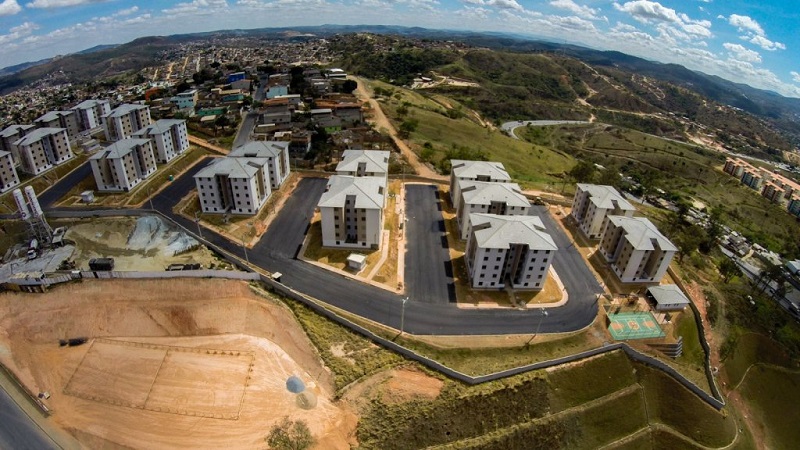Building better homes in Brazil
An eye-watering 3.75 million homes have been built in Brazil under the Minha Casa Minha Vida social housing programme over the last few years. The programme aims to reduce social inequality, provide permanent shelter and catalyse housing development.
Put into perspective, this equates to an annual rate of about 10 times all new housebuilding in the UK, so the achievement in creating so much social housing on a challenging budget (per dwelling) should not be underestimated.
However, there have been concerns relating to quality, sustainability and social cohesion relating to some of the earlier developments. Although recent improvements to building regulations have been made, the infrastructure to enforce minimum requirements is insufficient. Also, the performance of developments, in terms of future resilience has been poorly considered in the decision-making process of awarding government subsidies in lower income bracket developments.
Following a series of workshops with industry, academia, financial institutions, central and local government; a programme of work was developed by BRE, and funded by the United Nations Development Programme (UNDP), to raise standards for further developments.
BRE was able to bring in much expertise from the UK, Chile and Mexico, based on sustainability standards such as BREEAM and the UK’s Code for Sustainable Homes, (which was previously applied to new homes in the UK) and on the national housing surveys such as the English Housing Survey that BRE delivers for the UK Government. Given the different cultural and climatic conditions across Brazil, it was clear that success in transferring this knowledge would be largely dependent on close co-operation and meaningful engagement with key organisations in Brazil.
Therefore, BRE worked closely over a three-year period with Caixa Econômica Federal, the Ministry of Cities (MCidades) and the University of Brasilia to deliver the outputs. It was a highly effective and committed team, working through some difficult periods of political upheaval in Brazil. Caixa is one of Brazil’s largest banks and has embarked on a programme of encouraging sustainability and using financial investment to steer more socially responsible development.
The UK/Brazil team focussed on a number of priority outputs: a Sustainability Toolkit for Social Housing, a Balanced Scorecard assessment method for improving the resilience of new developments, and a Post-Occupancy Evaluation method, incorporating resident and technical surveys to prioritise improvements to existing dwellings. The development of each of these outputs was led by BRE, typically based upon previous knowledge, and then expanded or adapted by the joint working group and wider consultation exercises.
Gilli Hobbs, project lead says:
"Having launched the outputs at events across Brazil in September 2017, it is clear there is a great appetite and enthusiasm to start implementing. The team were delighted with the positive feedback and really enjoyed working together, which has been recognised through the project being shortlisted for a BEI (British Expertise International) 2018 award for International Collaboration."
The next stage of the process will be to pilot projects undertaken by a selection of housing developers keen to trial new thinking and improve their understanding of issues, such as energy efficiency, water efficiency, waste management, climate change adaptation, responsible sourcing, integrated transport systems and improved safety and security.
This article was originally published here by BRE Buzz on 18th Dec 2017. It was written by Simon Guy.
--BRE Buzz
[edit] Related articles on Designing Buildings Wiki
Featured articles and news
A case study and a warning to would-be developers
Creating four dwellings... after half a century of doing this job, why, oh why, is it so difficult?
Reform of the fire engineering profession
Fire Engineers Advisory Panel: Authoritative Statement, reactions and next steps.
Restoration and renewal of the Palace of Westminster
A complex project of cultural significance from full decant to EMI, opportunities and a potential a way forward.
Apprenticeships and the responsibility we share
Perspectives from the CIOB President as National Apprentice Week comes to a close.
The first line of defence against rain, wind and snow.
Building Safety recap January, 2026
What we missed at the end of last year, and at the start of this...
National Apprenticeship Week 2026, 9-15 Feb
Shining a light on the positive impacts for businesses, their apprentices and the wider economy alike.
Applications and benefits of acoustic flooring
From commercial to retail.
From solid to sprung and ribbed to raised.
Strengthening industry collaboration in Hong Kong
Hong Kong Institute of Construction and The Chartered Institute of Building sign Memorandum of Understanding.
A detailed description from the experts at Cornish Lime.
IHBC planning for growth with corporate plan development
Grow with the Institute by volunteering and CP25 consultation.
Connecting ambition and action for designers and specifiers.
Electrical skills gap deepens as apprenticeship starts fall despite surging demand says ECA.
Built environment bodies deepen joint action on EDI
B.E.Inclusive initiative agree next phase of joint equity, diversity and inclusion (EDI) action plan.
Recognising culture as key to sustainable economic growth
Creative UK Provocation paper: Culture as Growth Infrastructure.























